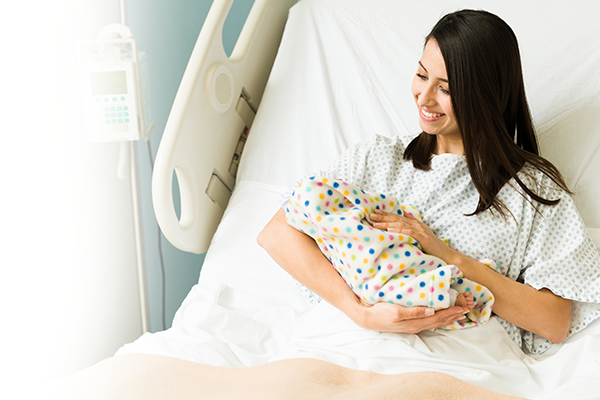Effect of childbirth on the development of the gut microbiota of the newborn baby
Research on the human microbiota and its impact on the functioning of the human body is currently booming. The gut microbiota, or gastrointestinal microbiota, forms a complex ecosystem that influences several aspects of human physiology, including: activation and maturation of the immune system and regulation of the immune response, as well as protection of the body by inhibiting pathogenic bacteria1.
The development of the immune system depends on the composition of the intestinal flora primarily during the neonatal and infant period. Thus, the initial period of colonization of the child is important, which is affected by many factors, as the most important are indicated: the type of birth, and the method of feeding.1 Natural birth is the most desirable. Until recently, the baby’s digestive tract was thought to be sterile at birth. It turns out that this is not true; bacterial colonization begins as early as the fetal period, gradually increases during childbirth and the first days of life of the newborn, then changes until the profile of gut microbiota found in adults is established2. During natural childbirth, the newborn acquires microorganisms from the genital tract and gastrointestinal tract of the mother, and this is the most correct way of succession of microorganisms.If the pregnancy is terminated by cesarean section, colonization is often haphazard, and newborns are colonized with skin microflora, including, unfortunately, hospital strains3.
The immune system of a healthy, donor newborn, despite the development of anatomical structures, is immature. Pioneer microorganisms are the first antigens that stimulate the development of a child’s immunity. It is important that this primary colonization proceed appropriately, which is why the type of delivery is so important. The first bacteria that should be in the baby’s digestive tract are Escherichia coli from the mother’s intestines. In the course of normal colonization, Enterococcus, Staphylococcus and then Lactobacillus bacteria from the mother’s vagina and gastrointestinal tract also appear in the baby’s intestines. In addition, in children fed with breast milk, approx. 2 days of life appear particularly important bacteria of the genus Bifidobacterium4.
In children after cesarean section, the predominant microorganisms are those residing on the skin: staphylococci, pseudomacrophages, Propionibacterium and those found in the hospital environment. The bacterial flora in these newborns is less diverse and the total number of microorganisms is lower than in natural-born babies, in addition, probiotic bacteria Bifidobacterium are absent or scarce5. The microbial type profile after cesarean section is abnormal, which can have serious immune and metabolic consequences. Disturbed composition of the intestinal microflora in newborns after cesarean section, can affect the development later in life of diseases such as allergy, atopy, asthma, obesity, inflammatory bowel disease and type I diabetes6. Recent studies have shown that newborns after cesarean section are more likely to reveal symptoms of allergies and asthma, which is related to the delayed colonization of the intestines of these children with probiotic flora affecting the formation of the immune profile7.
Nowadays, there is no doubt that the process of proper bacterial colonization in the gut after birth has a significant impact on the establishment of physiological functions, metabolism and immunity in the child3, and studies indicate that natural childbirth has a positive impact on the development of the gastrointestinal microbiota .
Bibliography:
- Gałęcka M., Bartnicka A., Szewc M., Mazela J. Formation of the gut microbiota of infants as a prerequisite for health maintenance Medical Standards/Pediatrics;2016;13:359-3672.
- Szczapa J. Probiotics in the perinatal period Advances in Neonatology 2018;24(1): 47-52
- Dominguez-Bello MG, Costello EK, Contreras M et al. Delivery mode shapes theacquisition and structure of the initial microbiota across multiple body habitats innewborns. Proc Natl Acad Sci USA 2010;107:11971-11975.
- Roży A., Jaguś P., Chorostowska-Wynimko J. The role of probiotics in the prevention and treatment of allergic diseases, Pneumonologia i Alergologia Polska 2012;80(1):65-76
- Dominguez-Bello MG, Costello EK, Contreras M et al. Delivery mode shapes theacquisition and structure of the initial microbiota across multiple body habitats innewborns. PNAS 2010;107(26):11971–119756.
- Munyaka PM, Khafipour E, Ghia JE. External influence of early childhoodestablishment of gut microbiota and subsequent health implications. Front Pediatr2014;2:109-1177.
- Sevelsted A, Stokholm J, Bonnelykke K, Bisgaard H. Cesarean section and chronicimmune disorders. Pediatrics 2015;135(1):92-98
Rate this article:











